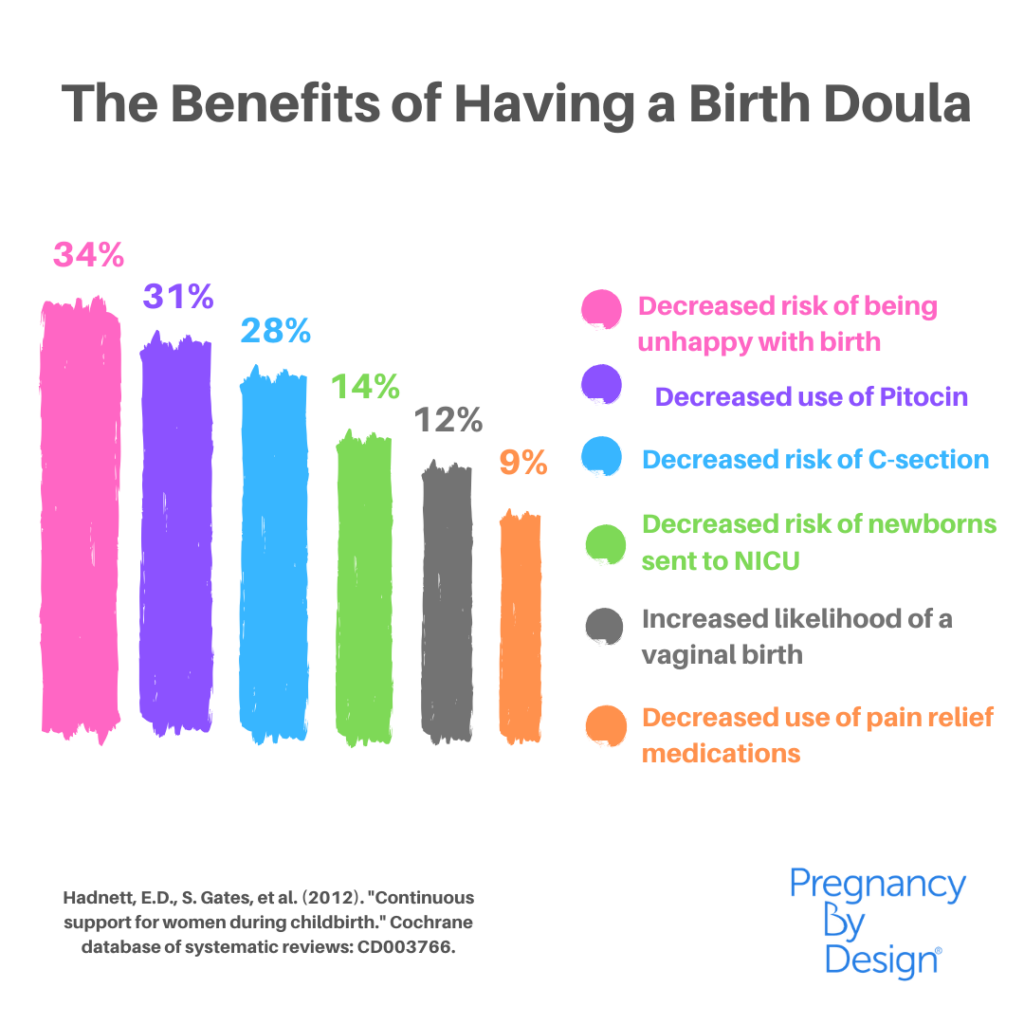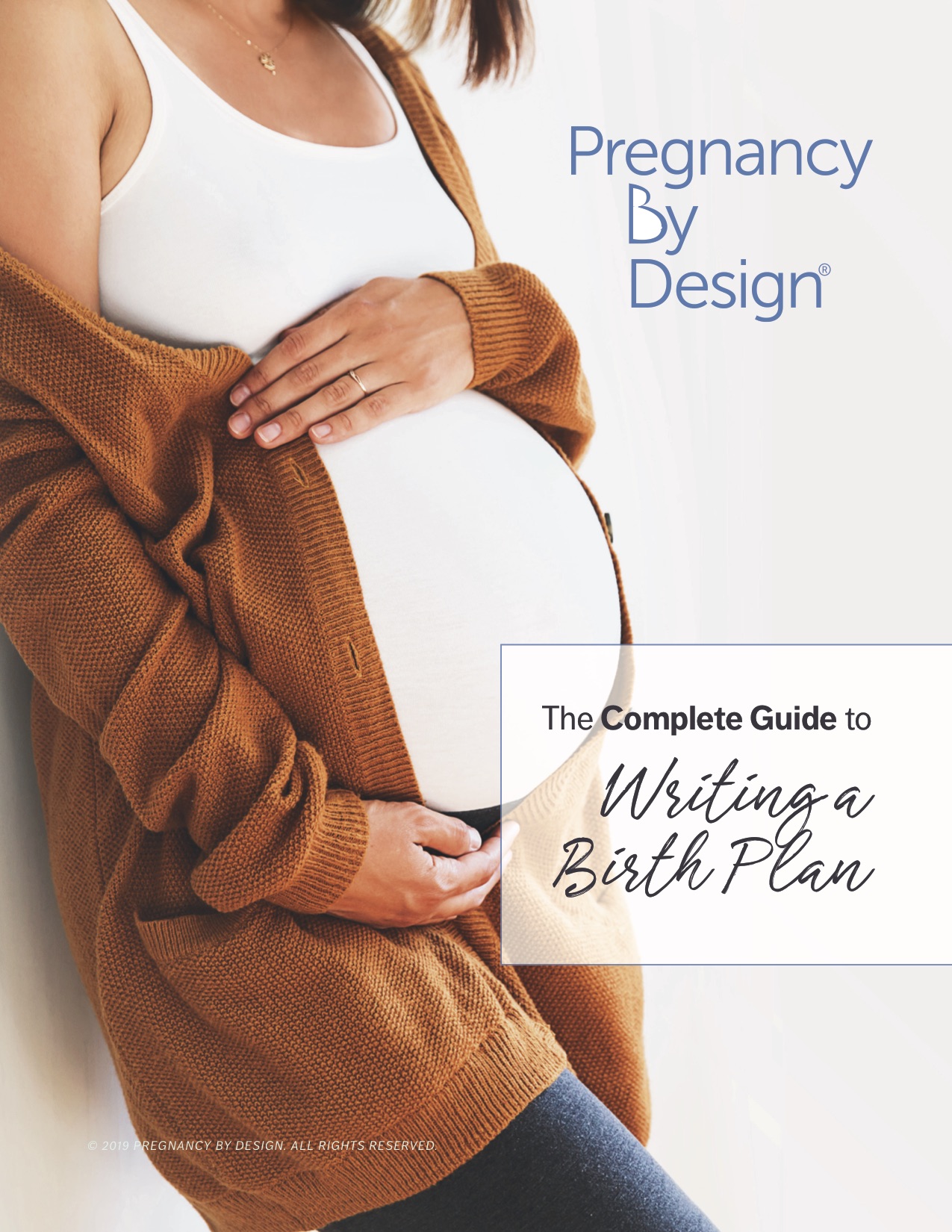Birth Doulas
A birth doula is a non-medical, professional birth worker that you hire to be with you during labor and delivery. They help labor progress more comfortably, increase your feelings of safety, and help your partner be more involved. The term doula comes from the Greek word meaning woman, caregiver or servant.
They provide physical support, emotional support, and informational support. Doulas know birth well. Seasoned doulas have seen birth unfold first-hand many times and so are specially equipped to walk with you on your journey.
Birth doulas are trained to assist during labor. While they have not had medical training, most have one or more certifications or training that give them special knowledge in the birth room. They have a ‘bag of tricks’ they use to help you during the birth experience.
They can help you find the best position to labor in, explain the birth process, suggest certain movements or exercises to bring baby down or for pain relief, give massages, work with essential oils, and much more. They are really good at explaining birth options and creating birth plans . Many birth doulas are often childbirth educators and offer childbirth education classes to help prepare you for the birth you are seeking.
Doulas are present! One of the best parts about having a doula is that she stays with you, providing continuous support during labor. Your nurse and provider will be in and out of the room attending to their other duties. She is beholden to no one except you and will stay by your side no matter how long it takes to support you during labor.
Doula vs. Midwife Roles in Childbirth
What is the Difference Between a Doula and a Midwife?
Your Midwife is charged with issues of safety; your doula, with issues of comfort
Doula vs Midwife is not an apples-to-apples comparison.
A doula and a midwife are both birth professionals who provide support to women during pregnancy, labor and delivery. However, they have different roles, training and scope of practice.
A doula is a trained birth companion who provides emotional, physical and informational support to a woman and her partner during labor and delivery. A doula’s primary focus is to offer comfort measures, such as massage, relaxation techniques and encouragement, to help the women manage the physical and emotional aspects of childbirth. Doulas do not provide medical care or make decisions about medical procedures. Medical decisions are made by Midwives and Ob’s.
A Midwife is a healthcare professional who is trained and licensed to provide medical care during pregnancy, labor, delivery and postpartum. Midwives have different certifications including certified nurse-midwife, certified midwife, or certified professional midwife. You can learn more about Midwives here.
It’s the Midwives job to keep an eye on your labor progress, vital signs, the baby’s well being and tolerance to labor. A Midwife will be the one watching for and handling issues if they arise. Midwives may also offer gynecological services to women through all stages of life.
It cannot be stressed enough that your Midwife is charged with issues of safety; your doula, with issues of comfort. However many Midwives also act in a doula-like capacity in labor. A Midwife is more likely than an OB to rub your back, ask how you’re feeling, and suggest position changes. But her first priority is your and baby’s safety.
Do I Need A Doula if I Have a Midwife?
Everyone deserves a doula. As we discussed above, a Midwife is more likely than an ObGyn to consider your comfort. But a vast majority of Midwives do not stay by your side or have your comfort as their primary concern. A doula does.
No matter what kind of birth you are planning, home birth, birth center, or hospital birth, waterbirth, a birth doula can make it better, easier and more joyful. Drug-free, natural birth with a Midwife is a great place to have a doula because she can help with comfort measures and navigate the intensity of the experience.
If you are Preparing for a Vaginal Birth After Cesarean having a doula is highly recommended! Even a pre-labor cesarean benefits from someone staying with you by the table if your partner goes to the baby.
What Kind of Things Does a Doula Do?
Most relationships with a doula start in pregnancy. You find someone you feel good about and meet once or twice for prenatal visits. During this time she will give you her tips for labor and you’ll talk about your birth plan, including what you envision everyone’s roles on your birth team being.
In labor, she does many things all tailored to the needs of her client and the labor. Their practice styles may vary, some use the rebozo, some use plenty of encouraging speech, some are trained massage therapists.
A Doula Might:
- Help you stay calm
- Run errands for you
- Answer your questions
- Listen
- Explain your options
- Suggest changes in position
- Support you physically
- Hold your hand
- Massage
- Give unbiased support
- Help you labor longer at home
- Take photos
- Make sure you stay hydrated and fed
- Share tricks to help progress, even with an epidural
- Explain what is happening, even if no one else does
- Help you write your birth plan
- Help you breathe optimally
- Share in the emotion
- Help start breastfeeding
- Help with a childbirth course
How Much Does a Doula Cost?
The cost varies a lot. Sometimes there are new doulas looking for experience, nursing students or staff doulas that you can use for free. Some high-demand luxury doulas charge thousands of dollars.
The cost also depends on where you live. In smaller towns, it can be as low as $400 and in big cities, the average is closer to $1000. Many offer payment plans. Doulas are definitely worth it!
What are the Benefits of Having a Doula?
The benefits cannot be enumerated, as they will vary as widely as the doulas and the people who hire them. Here are some common perks:
- You pick the certified doula who is right for you and she attends your birth—no on-call lottery
- Stays with you through shift changes, overnight, and into the next day if necessary
- Helps your partner be more involved
- You’re likely to experience an easier, more physiologically natural birth (see below)
- She can help you navigate hospital procedures, rules, and events
- Prenatal assistance with questions, choosing a medical care provider, and community resources
- Increase in confidence and positive thinking about birth and yourself
- Access to a lending library of books and labor tools
- You are less likely to have a c-section. A 39% decrease in cesarean birth has been shown with doula support!
Is There Any Research About the Benefits of Doulas in Labor?
Research shows that with the continuous support of women during childbirth, they will be more likely to:
- Feel less pain
- Less interventions
- Have a vaginal birth
- Avoid epidural pain medication, if you want to
- Labor under your own power, without augmentation
- Have a shorter labor (by an average of 41 minutes)
- Deliver without forceps or vacuum
- Have a baby with a high Apgar score
- Have a more positive childbirth experience
- Be satisfied with your birth experience
- Increased VBAC success
According to the American College of Obstetricians and Gynecologists evidence suggests that “continuous one-to-one emotional support provided by support personnel, such as a doula, is associated with improved outcomes for women in labor.”

Are There Any Disadvantages of Doulas?
Hiring a doula will surely improve your odds of a vaginal birth and lower your risk of having C-section delivery, but as Dr. Elizabeth often reminds expecting moms “Doulas are not magic wands”.
Choosing the right provider and place to have your baby is of utmost importance along with having a doula. Doulas can help advocate for you but your birth will often unfold based on how your provider and hospital/birth center practice.
The Birth Profile Assessment helps with providing insights into your unique personality and belief system to help identify the type of provider and place you may be best suit you and your baby.
Doulas are often well-versed in knowing which providers may provide specific birth choices like waterbirth at a birth center or VBAC (Vaginal Birth After Cesarean). Honestly there is no real disadvantage to having a doula in the delivery room at your baby’s birth.
Can my Husband/Friend/Mom be My Doula?
In the olden days, we had lots of supportive female family members and friends to be with us in labor. Most of them were there for our comfort and would have seen plenty of birth before it. If you have someone in your life who can act as a labor support person, that may work just fine. It may also backfire because of their close association with you.
One of the benefits of a doula is that they aren’t emotionally tied up in your birth the same way your spouse or mom is. They experience emotion, of course, and may even show it. But they are not paralyzed or confused by it the way someone who is part of your daily life may be.
This is one reason why you need a doula’s care, even in you have an awesome husband.
Doulas are also a great help and support for dads and help them be more involved in the birth. The concept of men at birth is very new in the history of the world. Thousands of years of birth and only in the last 50 have we even thought about inviting the men we love into the room. Sometimes they need some help being there and to find their role and place during birth.
Moms are a tricky one, too. If your mom or friend knows birth and your relationship is such that they make you feel awesome 99% of the time, they may be effective at continuous labor support.
Where Do I Find a Doula?
Ask your Midwife if she has any recommendations, midwives and doulas are in a tight knit community but don’t stop there. Look for business cards around your birthing center or waiting room. Ask other moms in the area.
Tips for Hiring the Right Doula for You:
- Always interview more than one. They often have ‘meet-for-coffee’ visits where you can learn more about their practice and see if you are a good fit.
- The person you hire should make you and your partner feel very comfortable, positive, and relaxed. It doesn’t matter as much how many births she’s attended. What really matters is that having her in the room will be a continuous physical, emotional, and informational support well worth your time and money.
Birth is a big deal! There is no bigger deal. You can’t have this birth to do again. Invest in certified doula care.
Postpartum Doulas
Provide post-birth support in the first days and weeks after your new baby arrives. They provide practical and educational support to help with mother-baby bonding, infant feeding and newborn care, emotional and physical recovery from your birth, and techniques for soothing your baby. They may also help with the baby’s laundry, the dishes or prepare a healthy meal for you. Many birth doulas will include 1 or 2 postpartum visits as part of their services.
Doulas can be trained in more than one area and are able to serve as more than one type of doula. We strongly recommend having a birth doula and a postpartum doula!
Disclaimer: Pregnancy by Design’s information is not a substitute for professional medical advice or treatment. Always ask your healthcare provider about any health concerns you may have.
Cited Resources
ACOG (2019). Approaches to Limit Intervention During Labor and Birth. Number 766. Retrieved from https://www.acog.org/-/media/project/acog/acogorg/clinical/files/committee-opinion/articles/2019/02/approaches-to-limit-intervention-during-labor-and-birth.pdf
Declercq ER, Sakala C, Corry MP, Applebaum S. Listening to Mothers III: Pregnancy and Birth. Childbirth Connection; New York: 2013.
DONA International (2018). Benefits of a Doula. Retrieved from https://www.dona.org/what-is-a-doula/benefits-of-a-doula/
Hodnett ED, Gates S, Hofmeyr GJ, Sakala C. Continuous support for women during childbirth. Cochrane Database Syst Rev. 2011;(7):CD003766.
Kennell J, Klaus M, McGrath S, Robertson S, Hinkley C. Continuous emotional support during labor in a US hospital. JAMA. 1991;265(17):2197-2201.








 Hospital or Birthing Center? What are the Differences?
Hospital or Birthing Center? What are the Differences?
I like that you mentioned hiring a doula is sometimes better than having someone you know to act in that position because doulas can be more objective and help more in a bad situation. My mom had a hard time with my youngest sister’s birth and my dad who was the only one there to support her kind of freaked out. It would have been better to have an objective steady presence there as well.